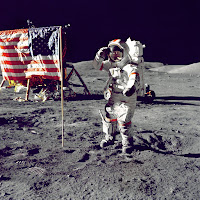 |
| Apollo 11 moon landing Image: unsplash.com |
Based in New York, Beecher Scarlett is a respected presence in the media sales arena who has held executive positions with companies such as 20th Century Fox and NBCUniversal Media. Globally focused, Beecher Scarlett has a strong interest in news that shapes contemporary society.
Marking the Apollo 11 moon landing’s 50th anniversary, a recent New York Times article brought focus to a situation in which “space travel has again entered the national conversation.’” At the forefront of this is a pledge by the president to send US astronauts back to the moon by 2024, as well as the efforts of “swashbuckling rocket oligarchs” such as Elon Musk to attain never-achieved milestones such as a Mars colony.
Looking back at the first man on the moon in 1969, many forget that the mission was vehemently opposed by many, including former President Dwight D. Eisenhower. A nationwide poll in 1966 found that 48 percent of people supported cutting funding for the space program if necessary, over a host of other government programs. Relatively soon after the Apollo’s success the project was abandoned due to its cost, and it has been more than four decades since the last manned flight to the moon.
With momentum shifting once again toward manned exploration of the moon and other planets, the Times article posits that “barring war or economic apocalypse” it seems reasonable to expect that people will reach Mars within the present generation. The question is whether it is worth the cost, when there are so many problems on Earth that still need to be solved.
Marking the Apollo 11 moon landing’s 50th anniversary, a recent New York Times article brought focus to a situation in which “space travel has again entered the national conversation.’” At the forefront of this is a pledge by the president to send US astronauts back to the moon by 2024, as well as the efforts of “swashbuckling rocket oligarchs” such as Elon Musk to attain never-achieved milestones such as a Mars colony.
Looking back at the first man on the moon in 1969, many forget that the mission was vehemently opposed by many, including former President Dwight D. Eisenhower. A nationwide poll in 1966 found that 48 percent of people supported cutting funding for the space program if necessary, over a host of other government programs. Relatively soon after the Apollo’s success the project was abandoned due to its cost, and it has been more than four decades since the last manned flight to the moon.
With momentum shifting once again toward manned exploration of the moon and other planets, the Times article posits that “barring war or economic apocalypse” it seems reasonable to expect that people will reach Mars within the present generation. The question is whether it is worth the cost, when there are so many problems on Earth that still need to be solved.

